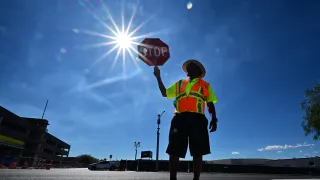California’s South Central Valley braces for oppressive heat that could dampen Fourth of July festivities as a massive high-pressure system strengthens throughout the week. This temperature surge raises the risk of wildfires and increases energy demands, forecasters warn.

Intense Heat Wave Forecast
AccuWeather senior meteorologist Scott Homan predicts significant temperature increases in the valleys, with records likely to be challenged. An excessive heat watch has been issued for the Sacramento and San Joaquin valleys from July 2 through July 6. Homan emphasizes the importance of hydration and staying near cooling sources during the holiday, which many spend outdoors. Temperatures throughout the region are expected to reach the mid-100s, with Fresno predicted to experience an “extreme” heat wave, potentially hitting 115 degrees by Saturday. This would tie the record high for that date. The dry conditions also mean there will likely be bans or limits on fireworks due to the increased wildfire risk. “There’s a major concern for wildfires, especially on Independence Day,” Homan noted.
Impact on Celebrations and Safety
The heat surge affecting California is part of a broader weather pattern impacting seven states in the western United States, including Arizona, Utah, Nevada, Oregon, Washington, and Idaho. For instance, Medford, Oregon, could see temperatures rise above 100 degrees for the holiday and beyond. AccuWeather long-range forecaster Paul Pastelok advised caution for individuals setting off fireworks, especially in drought-stricken areas with dried-out vegetation.
The South Central Valley, stretching from Bakersfield to north of Sacramento, is expected to bear the brunt of the heat. This scorching weather will also strain the state’s energy grid as residents increase their use of air conditioning. The stagnant air resulting from the high-pressure system will contribute to poorer air quality in vulnerable areas. “The higher the heat, the more pollutants in the air,” Homan explained. “That will be a problem as we head into the weekend.”
Statewide Concerns and Potential Relief
Temperatures in Death Valley, known for holding the world’s all-time hottest recorded temperature of 134 degrees in 1913, will likely approach but not surpass this mark. Fortunately, relief can be found along California’s coasts. Patchy, low morning clouds will dissipate, giving way to sunshine and temperatures in the mid-to-upper 70s. “That should make for a nice weekend,” Homan said.

As California prepares for the Fourth of July, residents and visitors are urged to stay hydrated, seek shade or air-conditioned spaces, and follow local guidelines regarding fireworks and outdoor activities to ensure a safe and enjoyable holiday despite the extreme heat.
